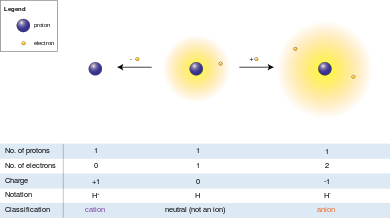What does cationic mean?
Definitions for cationic
-ˈɒn ɪkcation·ic
This dictionary definitions page includes all the possible meanings, example usage and translations of the word cationic.
Princeton's WordNet
cationicadjective
of or relating to cations
Wiktionary
cationicadjective
of, relating to, or being a cation
Wikipedia
cationic
An ion () is an atom or molecule with a net electrical charge. The charge of an electron is considered to be negative by convention and this charge is equal and opposite to the charge of a proton, which is considered to be positive by convention. The net charge of an ion is not zero because its total number of electrons is unequal to its total number of protons. A cation is a positively charged ion with fewer electrons than protons while an anion is a negatively charged ion with more electrons than protons. Opposite electric charges are pulled towards one another by electrostatic force, so cations and anions attract each other and readily form ionic compounds. Ions consisting of only a single atom are termed atomic or monatomic ions, while two or more atoms form molecular ions or polyatomic ions. In the case of physical ionization in a fluid (gas or liquid), "ion pairs" are created by spontaneous molecule collisions, where each generated pair consists of a free electron and a positive ion. Ions are also created by chemical interactions, such as the dissolution of a salt in liquids, or by other means, such as passing a direct current through a conducting solution, dissolving an anode via ionization.
ChatGPT
cationic
Cationic refers to a substance or structure that has a positive charge due to the loss of one or more electrons. This often refers to ions or molecules in chemistry and biology. The charge is created when the atom or molecule has fewer electrons than protons. Cationic substances play important roles in various chemical reactions and biological processes.
Usage in printed sourcesFrom:
- [["1873","16"],["1900","1"],["1901","6"],["1903","3"],["1904","51"],["1906","2"],["1908","36"],["1910","2"],["1911","4"],["1912","4"],["1913","5"],["1914","4"],["1915","4"],["1916","29"],["1917","16"],["1918","47"],["1919","11"],["1920","11"],["1921","37"],["1922","53"],["1923","22"],["1924","14"],["1925","11"],["1926","7"],["1927","8"],["1928","35"],["1929","87"],["1930","19"],["1931","7"],["1932","29"],["1933","26"],["1934","45"],["1935","20"],["1936","116"],["1937","173"],["1938","254"],["1939","71"],["1940","36"],["1941","39"],["1942","58"],["1943","63"],["1944","112"],["1945","505"],["1946","207"],["1947","181"],["1948","292"],["1949","951"],["1950","626"],["1951","600"],["1952","582"],["1953","605"],["1954","782"],["1955","667"],["1956","1222"],["1957","1321"],["1958","1562"],["1959","1010"],["1960","1487"],["1961","1359"],["1962","2510"],["1963","2190"],["1964","2054"],["1965","2212"],["1966","1908"],["1967","2514"],["1968","2875"],["1969","2376"],["1970","2562"],["1971","2864"],["1972","2989"],["1973","3330"],["1974","3245"],["1975","3271"],["1976","3312"],["1977","3619"],["1978","3085"],["1979","4934"],["1980","4303"],["1981","5399"],["1982","4787"],["1983","4700"],["1984","4819"],["1985","5791"],["1986","4778"],["1987","5220"],["1988","5479"],["1989","7334"],["1990","7704"],["1991","8187"],["1992","8215"],["1993","7526"],["1994","7050"],["1995","7448"],["1996","8943"],["1997","9751"],["1998","9624"],["1999","9763"],["2000","10386"],["2001","11156"],["2002","11514"],["2003","14202"],["2004","11991"],["2005","14040"],["2006","17007"],["2007","15024"],["2008","10881"]]
Anagrams for cationic »
aconitic
itaconic
Numerology
Chaldean Numerology
The numerical value of cationic in Chaldean Numerology is: 7
Pythagorean Numerology
The numerical value of cationic in Pythagorean Numerology is: 2
Popularity rank by frequency of use
Translations for cationic
From our Multilingual Translation Dictionary
- धनायनितHindi
- catiônicoPortuguese
- 阳离子Chinese
Get even more translations for cationic »
Translation
Find a translation for the cationic definition in other languages:
Select another language:
- - Select -
- 简体中文 (Chinese - Simplified)
- 繁體中文 (Chinese - Traditional)
- Español (Spanish)
- Esperanto (Esperanto)
- 日本語 (Japanese)
- Português (Portuguese)
- Deutsch (German)
- العربية (Arabic)
- Français (French)
- Русский (Russian)
- ಕನ್ನಡ (Kannada)
- 한국어 (Korean)
- עברית (Hebrew)
- Gaeilge (Irish)
- Українська (Ukrainian)
- اردو (Urdu)
- Magyar (Hungarian)
- मानक हिन्दी (Hindi)
- Indonesia (Indonesian)
- Italiano (Italian)
- தமிழ் (Tamil)
- Türkçe (Turkish)
- తెలుగు (Telugu)
- ภาษาไทย (Thai)
- Tiếng Việt (Vietnamese)
- Čeština (Czech)
- Polski (Polish)
- Bahasa Indonesia (Indonesian)
- Românește (Romanian)
- Nederlands (Dutch)
- Ελληνικά (Greek)
- Latinum (Latin)
- Svenska (Swedish)
- Dansk (Danish)
- Suomi (Finnish)
- فارسی (Persian)
- ייִדיש (Yiddish)
- հայերեն (Armenian)
- Norsk (Norwegian)
- English (English)
Word of the Day
Would you like us to send you a FREE new word definition delivered to your inbox daily?
Citation
Use the citation below to add this definition to your bibliography:
Style:MLAChicagoAPA
"cationic." Definitions.net. STANDS4 LLC, 2025. Web. 23 Feb. 2025. <https://www.definitions.net/definition/cationic>.







Discuss these cationic definitions with the community:
Report Comment
We're doing our best to make sure our content is useful, accurate and safe.
If by any chance you spot an inappropriate comment while navigating through our website please use this form to let us know, and we'll take care of it shortly.
Attachment
You need to be logged in to favorite.
Log In